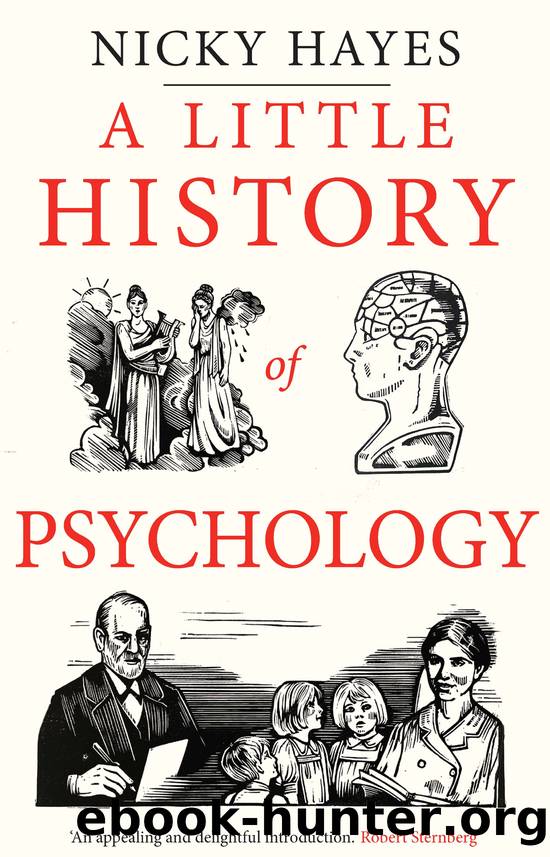A Little History of Psychology by Nicky Hayes

Author:Nicky Hayes
Language: eng
Format: epub
ISBN: 9780300277364
Publisher: Yale University Press
CHAPTER 23
Social Learning
GROUP CONFLICT, NORMS AND LEADERSHIP STYLES
As we saw in Chapter 20, George Miller had to nerve himself up to challenge the dominance of behaviourism. But in the meantime, another psychologist was quietly getting on with it. Albert Bandura â justifiably one of the most famous names in psychology â also wasnât happy with the behaviourist insistence that all learning derives from trial-and-error S-R (stimulus-response) connections.
Bandura consistently maintained a practical approach, possibly stemming from the way that, after finishing high school, he had spent some time working in Canadaâs Yukon Territory. The hard-working, hard-drinking and gambling culture that he found there was very different from that of his Albertan village upbringing and helped him to gain a wider perspective on life in general. At university, he fell into psychology almost by accident. He shared a carpool with medical and engineering students who all had early starts. Since his own lectures didnât begin until later, he looked for another early course to take, found psychology, and was hooked from then on. After graduation he went to the University of Iowa for his doctorate, working with Arthur Benton, who had been a student of William James and Clark Hull: the former was an experimentalist who recognised the importance of mind, and the latter a strict behaviourist, representing the dominant approach of the time.
Bandura was interested in learning, but he felt that the behaviourist insistence that learning could only happen from direct trial and error was too limiting. In fact, he believed, we do most of our learning second hand, by observing and imitating other people. Bandura began research on what he called âobservational learningâ in the early 1960s and conducted the now-famous âbobo dollâ experiments. In these, children were shown films of adults acting aggressively towards, and even attacking, a large punch-bag-style model known as a bobo doll. They were then taken into a playroom that contained a number of toys, including a bobo doll. Repeated studies showed that the children would copy what they had seen on screen: they had learned by observing someone elseâs behaviour, not by their own trial-and-error experience.
Bandura was careful to make sure that his research was carried out in strict accordance with behaviourist and experimental principles. His demonstrations of observational learning became widely accepted, quietly incorporating a small bit of mental representation into the strict behaviourism of learning theory. Thatâs why he is sometimes (quite rightly in my view) regarded as one of the founders of cognitive behaviourism. Bandura continued to study different aspects of imitation and identification, focusing particularly on the effects of modelling and self-regulation. By 1977, the cognitive movement was gaining ground in America, and he was able to be upfront about cognitive influences. His book, Social Learning Theory, openly discussed how social influences affect both cognition and behaviour. Quietly, Bandura had made a massive impact on psychologyâs knowledge of learning processes. But his legacy didnât stop there. He went on to explore the various mechanisms of personal agency, which we will come back to in Chapter 34.
Download
This site does not store any files on its server. We only index and link to content provided by other sites. Please contact the content providers to delete copyright contents if any and email us, we'll remove relevant links or contents immediately.
Rewire Your Anxious Brain by Catherine M. Pittman(18654)
Talking to Strangers by Malcolm Gladwell(13370)
The Art of Thinking Clearly by Rolf Dobelli(10487)
Mindhunter: Inside the FBI's Elite Serial Crime Unit by John E. Douglas & Mark Olshaker(9339)
Becoming Supernatural by Dr. Joe Dispenza(8214)
Change Your Questions, Change Your Life by Marilee Adams(7780)
Nudge - Improving Decisions about Health, Wealth, and Happiness by Thaler Sunstein(7706)
The Road Less Traveled by M. Scott Peck(7601)
The Lost Art of Listening by Michael P. Nichols(7506)
Mastermind: How to Think Like Sherlock Holmes by Maria Konnikova(7343)
Enlightenment Now: The Case for Reason, Science, Humanism, and Progress by Steven Pinker(7311)
Win Bigly by Scott Adams(7195)
The Way of Zen by Alan W. Watts(6614)
Daring Greatly by Brene Brown(6512)
Big Magic: Creative Living Beyond Fear by Elizabeth Gilbert(5771)
Grit by Angela Duckworth(5614)
Ego Is the Enemy by Ryan Holiday(5447)
Men In Love by Nancy Friday(5240)
The Laws of Human Nature by Robert Greene(5208)
